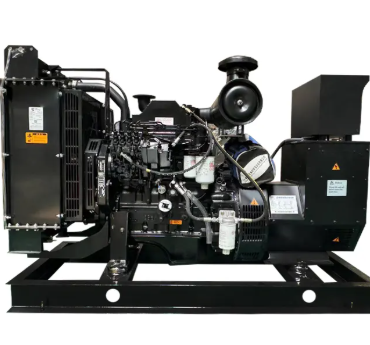Berechnung des Leistungsbedarfs und Generatordimensionierung
Festlegung der Gesamtleistung in Watt und Lastanforderungen
Die richtige Größe eines Dieselgenerators beginnt mit der Berechnung, wie viel Watt jedes Gerätes benötigt. Der Prozess geht darauf hinaus, eine detaillierte Bestandsaufnahme von allem zu machen, was Strom benötigt, und dabei nicht nur das zu berücksichtigen, was kontinuierlich läuft, sondern auch die kurzen Ausbrüche höherer Nachfrage während des Starts oder der schweren Nutzungszeiten. Wer es ernst meint, das richtig zu machen, sollte die Herstellerspezifikationen überprüfen oder sich an Lieferanten wenden, um genaue Wattzahlen zu erhalten, anstatt sich nur zu raten. Wenn man diese Zahlen richtig versteht, kann man sich später nicht in Situationen befinden, in denen der Generator unter Last zu kämpfen hat. Wenn man alle diese Zahlen kennt, wird die Auswahl des richtigen Generators einfach und gleichzeitig bei unterschiedlichen Betriebsbedingungen eine ordnungsgemäße Funktion beibehalten.
Umrechnung von kW in kVA für eine genaue Dimensionierung
Die Konvertierung zwischen Kilowatt (kW) und Kilowolt-Ampere (kVA) ist wichtig, wenn es darum geht, den richtigen Generator zu wählen. kW misst im Grunde, was wir als reale Leistung bezeichnen, während kVA auf scheinbare Leistung schaut, die sowohl die nützliche Diese Unterscheidung hilft, Situationen zu vermeiden, in denen Generatoren durch unerwartete elektrische Belastungen überlastet werden. Die Mathematik funktioniert so: kW ist gleich kVA multipliziert mit etwas, das man Leistungsfaktor nennt. Nehmen wir an, wir haben einen Leistungsfaktor von etwa 0,8; dann benötigt unser 100 kW Generator ungefähr 125 kVA Kapazität (gibt es nur 100 durch 0,8). Die meisten Ingenieure halten sich an diese Berechnungen, weil sie mit den Erwartungen der Industrie übereinstimmen, und helfen jedem, die Generatoren richtig zu sortieren, damit sie reibungslos laufen, ohne Geld für übergroße Geräte zu verschwenden.
Berücksichtigung der Start- im Vergleich zur Betriebswattzahl
Die Wahl des richtigen Generators bedeutet, den Unterschied zwischen Startwatt (auch als Einschlagstrom bezeichnet) und Betriebswatt (Steady-State) zu kennen. Nehmen wir zum Beispiel einen Kühlschrank oder ein Elektrowerkzeug, sie benötigen oft viel mehr Energie beim Starten als wenn sie normal laufen, weil es einen großen Anfangsstrom braucht, um loszulegen. Die meisten Menschen vergessen diese Lücke in den Strombedarf, weshalb so viele Generatoren am Ende unterleistung für das, was sie wirklich zu handhaben brauchen. Wenn ein Generator nicht richtig für diese Spitzen ausgelegt ist, funktionieren Geräte vielleicht nicht einmal richtig. Deshalb suchen kluge Leute immer nach Generatoren, die mit diesen kurzen, aber intensiven Strombedarf umgehen können. Das hilft, Blackouts zu verhindern und alles problemlos in Betrieb zu halten, sobald es anfängt.
Bewertung der Treibstoffeffizienz und des Umweltimpakts
Diesel im Vergleich zu anderen Treibstoffen: Effizienzvergleich
Diesel hat bei der Verarbeitung von Kraftstoffen eine besondere Eigenschaft, was den Energiegehalt und die Effizienz betrifft, verglichen mit normalem Gas oder Propan. Warum? Diesel hat mehr Energie pro Gallone, hauptsächlich wegen seiner höheren Energiedichte. Das bedeutet, dass diese Motoren mehr Leistung erzeugen können, während insgesamt weniger Treibstoff verbrannt wird, was offensichtlich zu einer besseren Kilometerleistung an der Pumpe führt und auch Geld für Betriebskosten spart. Nach Angaben des US-Energieministeriums sind die meisten Dieselmotoren um etwa 30 Prozent sparsamer als ihre Benzin-Äquivalente. Unternehmen wählen oft Dieselgeneratoren, wenn sie zuverlässige Ersatzstromversorgung benötigen, ohne die Bank zu brechen, besonders während unerwarteter Stromausfälle oder Stürme. Aber es gibt eine andere Seite dieser Geschichte, die es wert ist, erwähnt zu werden. Diesel wird zwar sicherlich effizient eingesetzt, erzeugt aber auch eine Menge Umweltverschmutzung. Wir sprechen hier speziell von Stickstoff-Oxiden und Feinstaub. Unternehmen müssen also die Vorteile abwägen, was in die Atmosphäre gelangt, um den richtigen Punkt zwischen einem reibungslosen Betrieb und dem Umweltschutz zu finden.
Emissionskonformität und Vorschriften
Dieselgeneratoren müssen strenge Emissionsregeln befolgen, wie die der EPA, wenn sie weiterlaufen wollen, ohne zu viel Schaden für den Planeten zu verursachen. Wenn sich Unternehmen an diese Regeln halten, reduzieren sie die Ausstoßemissionen von Kohlendioxid und anderen schädlichen Stoffen, was zur Erhaltung der Natur und der Gesundheit der Menschen beiträgt. Wenn man diese Standards nicht einhält, ist das nicht nur schlecht für die Umwelt. Unternehmen laufen Gefahr, mit hohen Geldstrafen bestraft zu werden und Kunden zu verlieren, die sich um grüne Anmeldeinformationen kümmern. Andererseits, wenn Unternehmen die Vorschriften tatsächlich einhalten, bleiben sie auf der richtigen Seite des Gesetzes und zeigen gleichzeitig, dass sie sich um Nachhaltigkeit kümmern. Die Umweltbehörde und ähnliche Organisationen haben Untersuchungen durchgeführt, die zeigen, daß neuere Dieselmodelle, die den aktuellen Standards entsprechen, weitaus weniger Umweltverschmutzung auslösen als ältere Modelle. Das bedeutet, dass Unternehmen, die grün werden wollen, immer noch Optionen haben, ohne ihre Stromversorgungssystemen komplett zu überholen.
Betriebsbezogene Aspekte: Geräuschentwicklung, Größe und Standortbedingungen
Schallpegelanforderungen für verschiedene Umgebungen
Wenn man einen Dieselgenerator auswählt, muss man darauf achten, wie laut er läuft, besonders wenn er in der Nähe von Häusern, Geschäften oder Fabriken sein wird. Die Geräuschregeln variieren je nach Standort des Generators. Nehmen wir zum Beispiel Nachbarschaften, die oft Generatoren unter 60 Dezibel benötigen, während Produktionszonen normalerweise etwa 85 Dezibel zulassen. Einige neuere leise Modelle laufen nur bis zu 50 dB, aber ältere Geräte können über 100 dB erreichen, was im Grunde so ist, als ob man neben einem Stehhammer steht. Wenn man etwas bekommt, das in die örtlichen Lärmgesetze passt, ist das sowohl rechtlich als auch sozial sinnvoll. Niemand will, dass sich Nachbarn beschweren oder Geldstrafen bekommen. Wer Lärmemissionen reduzieren möchte, sollte sich vielleicht spezielle schalldichte Kisten ansehen, die sich um Generatoren wickeln, oder sich für die neueren Generatoren mit Wechselrichtertechnik entscheiden, die überhaupt nicht so laut sind.
Bewertung der Raum- und Tragbarkeitsanforderungen
Bevor man einen Generator kauft, muss man sich vorstellen, wie viel Platz er braucht und ob er sich nicht bewegen wird. Feststehende Einheiten nehmen ziemlich viel Platz ein und müssen permanent irgendwo installiert werden, was am besten funktioniert, wenn es viel freie Fläche gibt, wie in Garagen oder Kellern. Trägliche Modelle sind völlig anders, obwohl sie überall hin gehen können, wo Strom benötigt wird. Vergessen Sie nicht zu prüfen, ob nicht nur der Generator selbst Platz hat, sondern auch, wenn später eine Wartung oder Betankung notwendig wird. Bevor Sie sich für eine bestimmte Modellgröße entscheiden, sollten Sie sich zweimal überlegen. Betrachten Sie sowohl die tatsächlichen Abmessungen der Einheit als auch den zusätzlichen Raum, der sie umgeben, um einen ordnungsgemäßen Luftstrom während des Betriebs zu gewährleisten. Das richtig zu machen bedeutet, ein Gleichgewicht zwischen dem zu finden, was physisch passt und was nach der Installation tatsächlich gut funktioniert.
Haushaltsplanung und langfristige Kostenaspekte
Anschaffungskosten im Vergleich zu Betriebskosten
Um einen Dieselgenerator auszuwählen, muss man wissen, was man im Voraus ausgibt, verglichen mit dem, was es kostet, ihn tagtäglich zu betreiben. Das Vorabgeld deckt den tatsächlichen Preis und die Installationsgebühren von Profis ab. Aber vergessen Sie nicht, dass sich das versteckte Geld entweder in der Straße entleert, oder die Treibstoffrechnungen, regelmäßige Wartungskontrollen, unerwartete Reparaturkosten, alles häuft sich ziemlich schnell auf. Dieselmotoren haben im Allgemeinen gute Kilometerleistung pro Gallone, aber niemand weiß, wann der Benzinpreis im nächsten Monat steigt oder plötzlich sinkt. Das macht die Planung von Budgets wirklich schwierig. Intelligente Käufer setzen sich mit Stift und Papier (oder einer Tabellensoftware) zusammen, um verschiedene Ausgaben-Szenarien für verschiedene Generatormodelle, die heute auf dem Markt erhältlich sind, nebeneinander zu erstellen. Die Betriebskosten unterscheiden sich stark, je nachdem, ob man Standby-Anlagen oder erstklassige Maschinen kauft, und je nachdem, wie viel man sie in den Hauptverkehrsstunden anfahren muss. Der Punkt ist, jeder, der sich Zeit nimmt, sich die Zahlen wirklich anzusehen, spart am Ende Hunderte, wenn nicht Tausende über mehrere Jahre, indem er von Anfang an fundierte Entscheidungen trifft.
Wartungsanforderungen und Supportverfügbarkeit
Die Erhaltung der routinemäßigen Wartungsarbeiten ist wirklich wichtig, wenn wir wollen, daß unsere Dieselgeneratoren in den kommenden Jahren optimal funktionieren. Wenn Unternehmen sich an die richtigen Wartungspläne halten, vermeiden sie die unangenehmen Überraschungen, die alle in Not versetzen, wenn der Strom ausfällt. Die Verfügbarkeit von Ersatzteilen und die Möglichkeit des lokalen Service spielen ebenfalls eine große Rolle, da diese Faktoren unmittelbar Einfluss auf die Zeit und das Geld haben, die für die Wartung aufgewendet werden. Generatoren, die in der Nähe von etablierten Servicezentren liegen, sind im Laufe der Zeit in der Regel günstiger zu warten. Viele Anlagenmanager berichten, dass sie nach regelmäßiger Wartung weniger Stillstand und längere Lebensdauer der Anlagen sehen, was den Unterschied in den langfristigen Ausgaben macht. Die Suche nach zuverlässigen Lieferanten, die qualitativ hochwertige Komponenten und technische Unterstützung schnell liefern können, bleibt entscheidend, um sowohl die Zuverlässigkeit als auch die Rendite der Investition zu maximieren.
Konsultation von zertifizierten Fachleuten für eine optimale Auswahl
Rolle von Elektrikern und Generator-Spezialisten
Bei der Auswahl von Generatoren für bestimmte Energiebedarf, Elektriker und Generator-Techniker wirklich in ihr Element treten. Diese Leute wissen genau, wie man herausfindet, welche Art von Strom jemand wirklich braucht und sie dann auf die bestmöglichen Generatoroptionen hinweist. Die meisten haben entsprechende Schulungen absolviert und sich die wichtigen Zertifizierungszeichen verdient, die die Sicherheit der Dinge gemäß allen Regeln im Buch gewährleisten. Zum Beispiel gehen zertifizierte Elektriker durch die Standorte, überprüfen die vorhandenen elektrischen Belastungen und kommen dann mit Vorschlägen für Generatoren zurück, die sowohl den Größenanforderungen entsprechen als auch effizient funktionieren. Wir sehen diese Art von intelligenten Installationen in Produktionsanlagen oder Krankenhäusern, wo selbst ein kurzer Stromausfall eine Katastrophe bedeuten könnte. Die wahre Magie geschieht, wenn Profis ihr tiefes Wissen über diese Systeme anwenden, um sicherzustellen, dass alles richtig vernetzt ist, damit es keine unerwarteten Blackouts gibt, die die Operationen vermasseln.
Maßgeschneiderte Lösungen für einzigartige Energiebedarfe
Unternehmen, die mit besonderen Strombedarfen konfrontiert sind, finden oft, dass herkömmliche Generatoren einfach nicht reichen. Deshalb wenden sich viele stattdessen maßgeschneiderten Lösungen zu. Fachleute aus der Branche arbeiten eng mit Unternehmen zusammen, um Systeme zu entwickeln, die genau ihren Anforderungen entsprechen und gleichzeitig den Betrieb reibungsloser gestalten. Wenn alles richtig vernetzt ist, passt die Stromversorgung zu dem, was das Unternehmen tatsächlich täglich braucht, wodurch Energieverschwendung reduziert und die allgemeine Funktionsfähigkeit verbessert wird. Nehmen wir zum Beispiel Rechenzentren, die sich die meisten nicht einmal eine Minute Stillstand leisten können. Maßgeschneiderte Systeme haben diesen Anlagen geholfen, ständig online zu bleiben, dank Ingenieuren, die wirklich verstehen, was ihre Strominfrastruktur zum Laufen bringt. Was ist das Ergebnis? Die Hilfe von Experten bedeutet, dass Unternehmen ihren Strombedarf besser bewältigen können, ohne dabei die Bank zu brechen oder die Umwelt zu schädigen.
Häufig gestellte Fragen
Wie bestimme ich die Gesamtleistungsanforderungen für meinen Generator?
Um die gesamten Watt-Anforderungen zu ermitteln, erstellen Sie eine Liste aller Geräte, die Sie betreiben möchten, und notieren Sie sowohl deren kontinuierliche als auch ihre Spitzenbelastungen. Konsultieren Sie die Gerätehandbücher für genaue Leistungsangaben, um eine präzise Bewertung sicherzustellen.
Was ist der Unterschied zwischen kW und kVA?
KW steht für wirkende Leistung, während kVA für scheinbare Leistung steht, die sowohl arbeitende als auch reaktive Leistung umfasst. Die Umrechnung von kW in kVA hilft dabei, die Größe Ihres Generators genau auf die realen elektrischen Anforderungen zuzuschneiden.
Warum ist es wichtig, den Unterschied zwischen Start- und Betriebsleistung zu kennen?
Die Startleistung berücksichtigt den anfänglichen Stromspitzenwert beim Einschalten der Geräte, der deutlich höher sein kann als die Betriebsleistung. Berücksichtigung dieser Werte stellt sicher, dass Ihr Generator diese Spitzenbelastungen bewältigen kann und Stromausfälle vermieden werden.
Warum Diesel vor Benzin oder Propan für Generatoren wählen?
Diesel hat eine höhere Energieerdichte, was zu einer besseren Kraftstoffeffizienz und niedrigeren Betriebskosten führt. Allerdings müssen Dieselfeneratoren aufgrund umweltbedingter Bedenken Abgasvorschriften einhalten.
Welche Wartung wird für Dieselfeneratoren benötigt?
Regelmäßige Wartung, einschließlich Kraftstoffüberprüfungen, Ölwechsel und Teilsicherungen, ist essenziell. Zuverlässige Supportdienste und leicht erhältliche Ersatzteile können die Effizienz steigern und das Lebensalter des Generators verlängern.
Inhaltsverzeichnis
- Berechnung des Leistungsbedarfs und Generatordimensionierung
- Bewertung der Treibstoffeffizienz und des Umweltimpakts
- Betriebsbezogene Aspekte: Geräuschentwicklung, Größe und Standortbedingungen
- Haushaltsplanung und langfristige Kostenaspekte
- Konsultation von zertifizierten Fachleuten für eine optimale Auswahl
-
Häufig gestellte Fragen
- Wie bestimme ich die Gesamtleistungsanforderungen für meinen Generator?
- Was ist der Unterschied zwischen kW und kVA?
- Warum ist es wichtig, den Unterschied zwischen Start- und Betriebsleistung zu kennen?
- Warum Diesel vor Benzin oder Propan für Generatoren wählen?
- Welche Wartung wird für Dieselfeneratoren benötigt?

